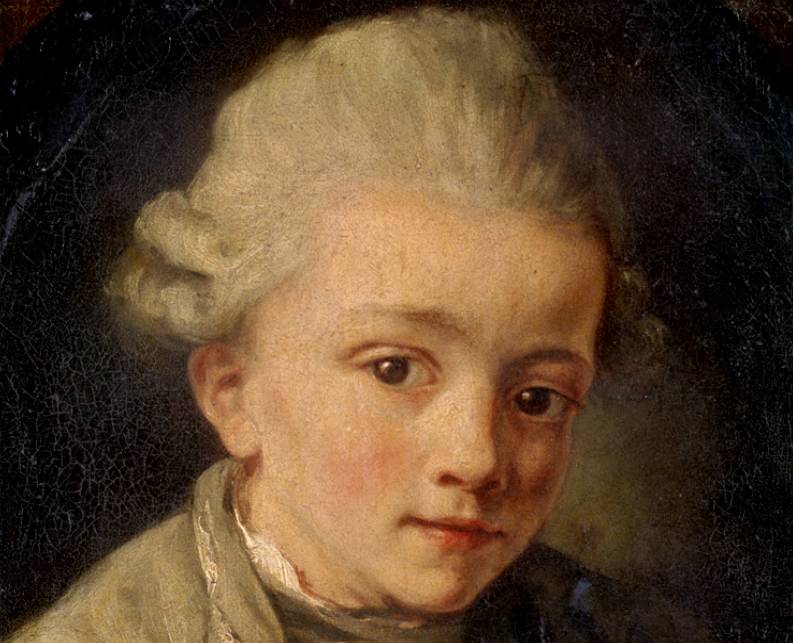Meet Young Mozart, Boy Genius
Part 1 of 5 of your Concert Notes
We’re following CPR Classical’s Great Composers Series on Mozart
We like to give you Concert Notes. Why? CPR Classical’s Scott O’Neil says it best…
“I’m convinced that the music itself has an inherent, aesthetic beauty to it, but when we understand the stories – certainly in the case of the tumultuous life of Wolfgang Mozart – but also the context that the music was written, not only do we understand the music better, but the music – the individual pieces themselves – sound more beautiful.”
Mozart, when only 4-5 years old, was found by his father to be composing music – with no formal training, making up his own musical notation. Here is what he composed, his Andante in C Major, K 1.a..
Leopold’s father takes young Wolfgang on a grand, three-and-a-half year tour of 88 cities in Europe. In the midst of touring, Leopold falls deathly ill in July, 1764. Mozart passes the time writing his first symphony. The second movement’s 4-note idea will become the basis of the finale of the ‘Jupiter’ symphony, his 41st and last. Here is that Andante movement from Mozart’s Symphony No. 1, written when he was not yet 10…
During the tour, Mozart meets the son of Johann Sebastian Bach, Johann Christian Bach, in the court of King George, where Bach works as music master to the Queen. Mozart sits on J.C. Bach’s lap, and the two play extemporaneously before the King & Queen of England for two hours, much like today’s jazz musicians play improvisationally.
Upon returning from their tour, Leopold begins teaching Wolfgang, challenging him with some serious piano works. Leopold plays works, then challenges Wolfgang to turn them into piano concertos. Notably, composer Schobert (not Schubert) wrote a piano sonata (Op. 17, no. 2) which, through these exercises, Mozart turned into the the second, Andante movement of his Piano Concerto No. 2, K. 39.
Fast forward to 1768. Mozart is now 12 and composes his first opera buffa (comic opera) to win a commission. In Vienna, an opera is to be written for the Austrian Emporer’s sister’s wedding. He pens, ‘La finta simplice‘ (The Feigned Simpleton) and wins the commission, only to have rival composers so sabotage the rehearsals and threaten to spoil the opera’s premiere that is is not performed until it opens in Salzburg in 1769. Keep in mind, adult composers are working to thwart the work of a 12 year old.
In 1770, Leopold and a now 14-year-old Mozart travel to the Vatican to hear Allegri’s Miserere at Easter. The Vatican considered the work such a treasure that no performer was allowed to take the music away from the Vatican under threat of excommunication. Famously, Mozart listens to the piece (which is over 12 minutes long) and writes it down – from memory. Word of this feat spreads, and the Pope ends up knighting Mozart rather than excommunicating him. Not long after, Mozart is commissioned to write his first opera seria, Mitridate, re di Ponto (Mithradates, King of Pontus).
For Mozart, this begins a series of opera commissions, one after another. During this wave of success, Mozart meets a superstar castrado of his day and is so inspired by his voice that Mozart pens his Exultate Jubilate, considered to be his first breakout masterpiece work.
Leopold began to profess his belief that his son’s musical gifts were nothing short of a miracle. He wrote a friend in 1768, saying,
“…if it is ever to be my duty to convince the world of this miracle, it is so now, when people are ridiculing whatever is called a miracle and denying all miracles… But because this miracle is too evident and consequently not to be denied, they want to suppress it. They refuse to let God have the honor.” Source on Google Books
This sounds good, Mozart’s on a roll, things are looking up. The Mozarts might be able to move to Italy, where Wolfgang is enjoying a lot of success. However, troubles are on the horizon.
More tomorrow!
—
This concert week, we’re listening to CPR Classical’s podcast series on Mozart. You can find the entire series here: http://www.cpr.org/classical/podcast/cpr-the-great-composers. Read along as we write excerpts from this podcast.
Featured image credit: Portrait of the young Mozart, attributed to Jean-Baptiste Greuze – https://commons.wikimedia.org/w/index.php?curid=1116573
##
The Longmont Chorale performs, “Requiem: Mozart’s Last Words” on Sunday, March 11, 2018 at 3PM at LifeBridge Christian Church in Longmont. The Chorale and guest soloists are accompanied by instrumentalists from the Longmont Symphony Orchestra.
The Longmont Chorale is a nonprofit Longmont choral group, an SATB choir which performs four major concerts in Longmont each season. Concert tickets and information are both available at LongmontChorale.org/Tickets.
Like this post? Share it with a friend, using the social media bar on the side of this page (desktop) or below (mobile).


